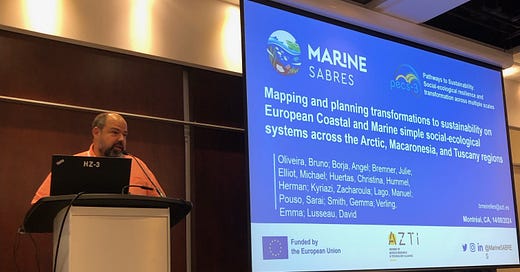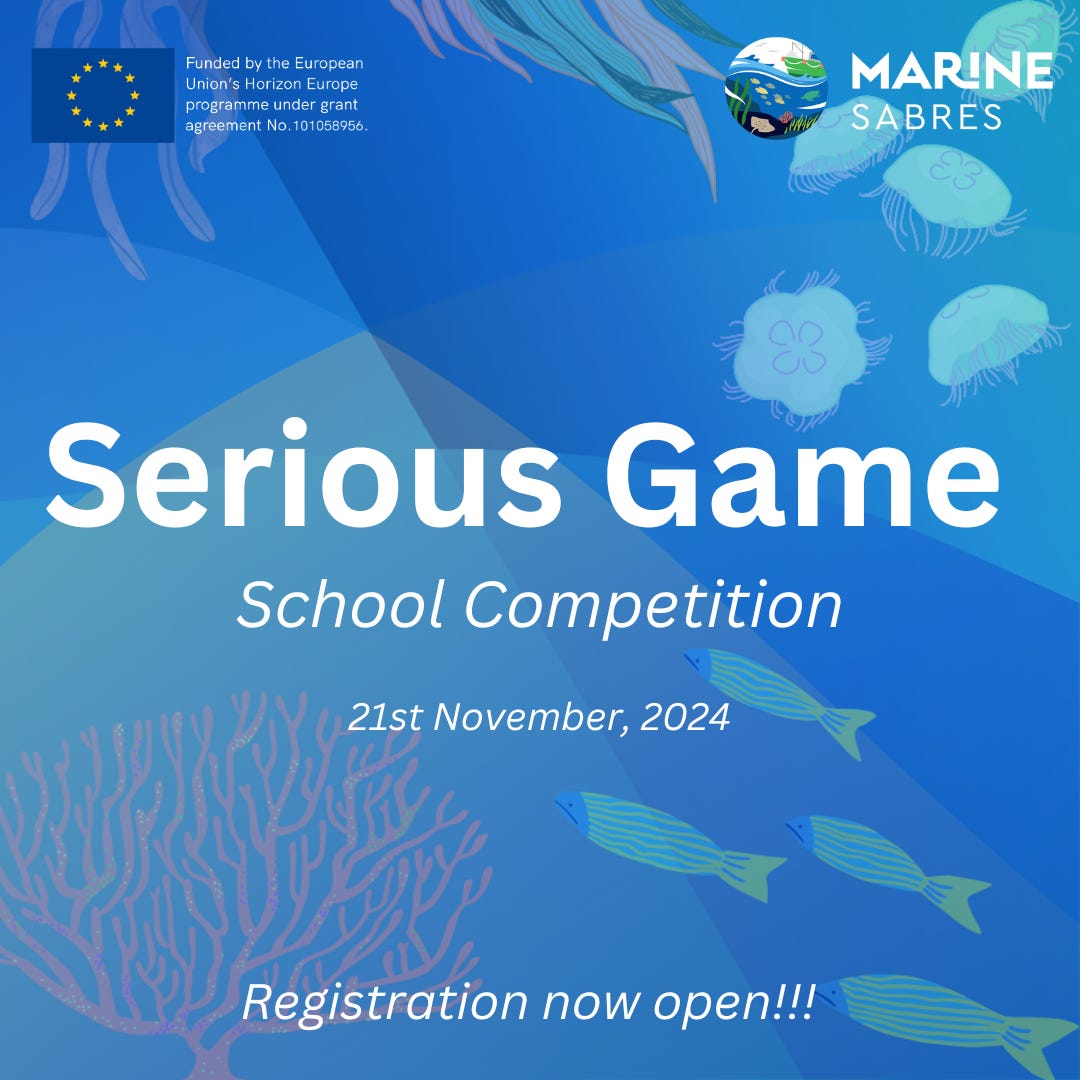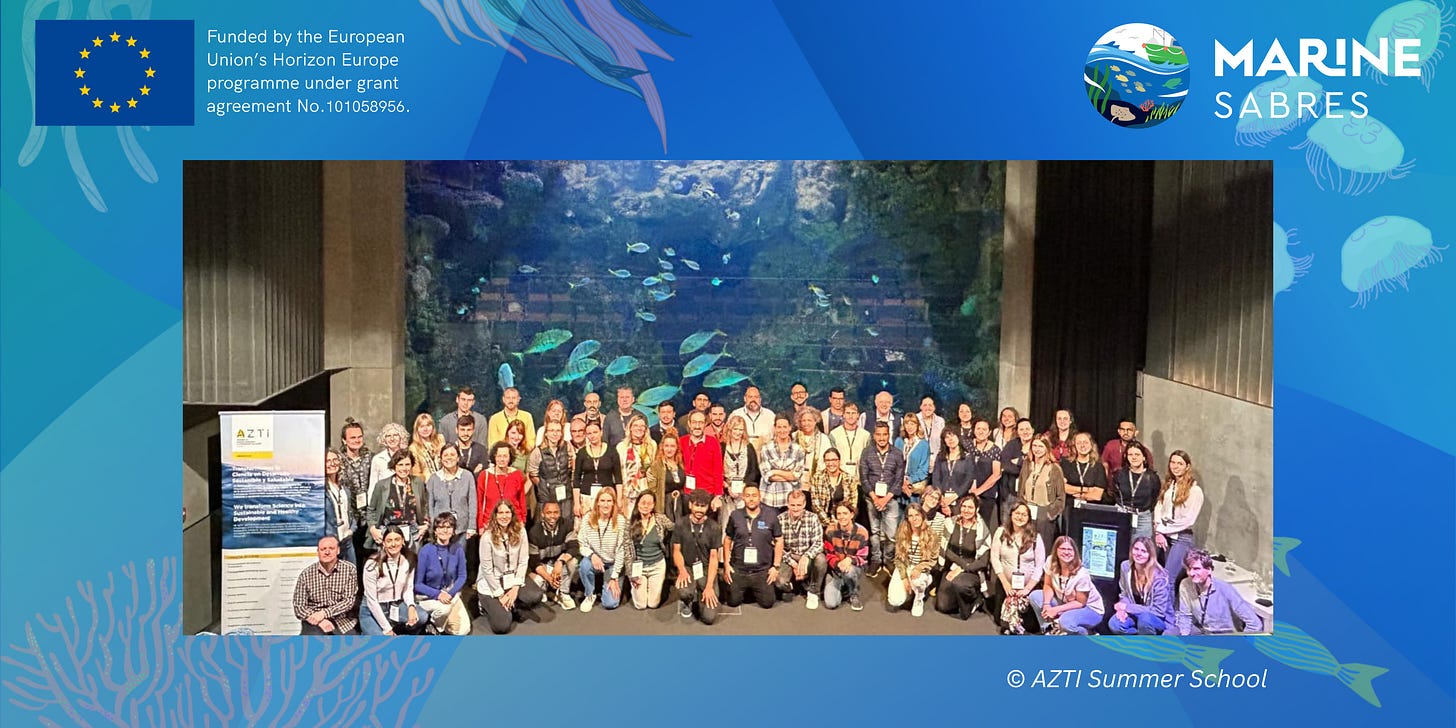Welcome to our second annual newsletter!
Below you’ll find articles from our project partners across Europe, that describe the various threads of Marine SABRES research, and the associated activities they have been involved in over the last year. We hope you enjoy them!
— The Marine SABRES Consortium
www.marinesabres.eu
Contents
Scroll to read the articles below, or view each article individually via the following links:
Marine SABRES at the PECS3 Conference in Canada - Bruno Meirelles de Oliveira, AZTI Marine Research
Marine SABRES at EU Researchers’ Night 2024 - Laura Caciagli, LifeWatch ERIC
Serious Game School Competition - Eleonora Parisi, LifeWatch ERIC
LifeWatch ERIC Visit Gran Canaria - Jesús Padrón García, ULPGC
Marine SABRES at Fuerteventura Island - Jesús Padrón García, ULPGC
Marine SABRES at GLISFO 2024 - Catherine Chambers (University Centre of the Westfjords) and Unn Laksá (Blue Resource / Sjókovin)
A postcard from the European Congress of Conservation Biology - Laura Caciagli, LifeWatch ERIC
LIFE INTEMARES Workshop Participation - Jesús Padrón García, ULPGC
The 20th Edition of the AZTI Summer-School in San Sebastian - Kathrin Kopke, UCC, MAREI
Marine SABRES Project to Host Stakeholder Workshop at WGINOR Meeting - Sandra Rybicki - HAFRO
Marine SABRES at the PECS3 Conference in Canada
AZTI Marine Research
The necessity of building a sustainable relationship with the ocean requires both adaptations of the current practices and a bold attitude to face the challenges of future scenarios. As a great part of the current relations with the ocean will require not only incremental but radical changes to be conducive to sustainable futures, understanding where and how these changes will be necessary is crucial and timely.
To tackle these challenges in the coastal realm, Marine SABRES presented its systemic approach to Social-Ecological Systems (SES) in the “PECS3 – Pathways to Sustainability: Social-ecological resilience and transformation across multiple scales” meeting in Montreal, Canada. From 12-16 of August 2024, the foremost thinkers and advocates of SES Transformations shared practices, ideas, and research projects discussing how to create transformative agendas for each place-based research, towards facing the challenges that the Anthropocene imposes. Marine SABRES was there, represented by Bruno Meirelles de Oliveira, a researcher at the AZTI Marine Research, under the supervision of Angel Borja.
Marine SABRES at EU Researchers’ Night 2024
LifeWatch ERIC
On September 27, 2024, LifeWatch ERIC participated in the European Researchers’ Night, contributing to its programme and engaging with participants, thanks to its research stand. On this occasion, LifeWatch ERIC presented in particular Marine SABRES project, organising the initiative “Marine SABRES in fairs: biodiversity conservation and restoration, sustainable blue economy and the benefits of ecotourism”.
During the event, LifeWatch ERIC presented results and activities carried out in the framework of the project, with a special focus on the simple socio-ecological system framework designed and developed with the active support and participation of local stakeholders in three European marine regions, where researchers are developing and testing ways to balance varying combinations of conservation priorities and economic activities. The booth promoted best practices and examples, fostered by the project’s approach, of sustainable use of marine resources and tourism, raising awareness on the importance of governance solutions to address the impacts of future economic and climate scenarios.
Serious Game School Competition
LifeWatch ERIC
Registration for the first Marine SABRES School Competition is now open! Are you a schoolteacher of natural or social sciences, English or CLIL, or maybe citizenship and environmental education? Are your students between 10 and 18 years old? Then this school competition is for you!
The Marine SABRES project designed an online serious game that will introduce your classroom to basic concepts of marine biology and coastal ecology and increase your students' awareness of the strong relations between us and the ocean. The first school competition will take place online on World Fisheries Day, Thursday 21st November 2024.
Why participate? Discover with your class science facts about us and the ocean! You will meet teachers and students from across Europe and learn from peers and a European network of researchers.
Download this presentation for more information about Marine SABRES and this international educational activity at the following link!
Questions? Doubts? Suggestions? Get in contact with Eleonora Parisi training@lifewatch.eu!
LifeWatch ERIC Visit Gran Canaria
ULPGC
From the 27th of May to the 1st of June 2024, LifeWatch ERIC visited Gran Canaria in order to record locations and conduct interviews with relevant stakeholders of the Macaronesia Demonstration Area, for the production of the SABRES Web TV documentary. The Marine SABRES research team from ECOAQUA’s Biodiversity and Conservation Research Group contributed to this visit through the coordination and planning of the event, as well as by proposing key stakeholders for interviewing, such as ECOAQUA researchers.
As part of this event, key sites for the Macaronesia Demonstration Area in Gran Canaria were filmed, including the municipalities of Mogán, Agaete, and La Aldea de San Nicolás, where Guguy (which aspires to be the first National Park with a marine area in the Canary Islands) is located.
You can access LifeWatch ERIC's collection of videos and interviews at the following link!
Marine SABRES at Fuerteventura Island
ULPGC
A trip to Fuerteventura island was undertaken on the 26th of April 2024, as part of Marine SABRES research activities, analyzing the results of a LIFE coastal restoration project near a site subject to touristic activity. This site included Saladar de Jandía, which is designated as a RAMSAR site, as well as a Special Area of Conservation under Natura 2000 and a Site of Scientific Interest according to the Canary Islands network of Protected Natural Spaces. The applicability to other relevant research sites in the Macaronesia was also considered.
As part of this research activity, fieldwork was performed in Saladar de Jandía, testing the success of natural restoration measures in a socioeconomic scenario of intense touristic activity. This included the identification of species of high ecological value, as well as compatible coastal infrastructure. Some of the pressures affecting the site were also identified and later discussed.
Marine SABRES at GLISFO 2024
University Centre of the Westfjords and Blue Resource / Sjókovin
We would like to thank our Marine SABRES colleagues Catherine Chambers (University Centre of the Westfjords) and Unn Laksá (Blue Resource / Sjókovin) who participated in the first ever 'GLISFO 2024 – Strengthening Regional Ties' workshop. This event, which took place in the Nordic House in Tórshavn was attended by over 70 researchers and university representatives between August 19th and 21st, and was organised by the Research Council of the Faroe Islands, the Greenland Research Council, Rannís – The Icelandic Centre for Research, and the Icelandic Arctic Cooperation Network.
The aim of the workshop was to increase research and university representatives collaboration and capacity in Greenland, Iceland, and the Faroe Islands, also known as the West Nordics. As part of this event, our Marine SABRES colleagues Unn and Catherine presented on the project as an example of GLISFO case studies in research, and discussed ideas for future collaborations with marine topics in focus.
You can read more about this workshop in the following post, and you can access pictures from the event here!
A postcard from the European Congress of Conservation Biology
LifeWatch ERIC
The European Congress of Conservation Biology (ECCB), organised by the Europe Section of the Society for Conservation Biology (SCB), was held in Bologna from 17th to the 21st June 2024. The Congress aimed to facilitate the exchange of conservation science and nature conservation practice and policy to promote the conservation of biological diversity in Europe.
The 7th ECCB focused on achieving a biodiversity-positive status by 2030. This theme presents a positive message and a call to action towards conserving biodiversity. Despite the challenges, new protected areas were established, carbon emissions were reduced, and there is a growing awareness of biodiversity’s importance for survival.
LifeWatch ERIC joined the conference, contributing to its scientific programme and engaging with participants and researchers from Europe and beyond, thanks to its exhibition booth. Cristina Di Muri and Flavio Monti (CNR/LifeWatch Italy) presented two contributions, “Harnessing FAIR biodiversity data and services to assess incidence and habitat vulnerability to non-indigenous species in Italy” and “Enhancing biodiversity conservation analysis through data harmonization” respectively. In parallel, the LifeWatch ERIC booth proved to be a valuable means to engage with over 150 representatives of the community of Conservation Biologists gathered at the event, illustrating its offer of services and science tools and understanding their needs for ICT resources, thanks to the dedicated survey administered at LifeWatch ERIC stand.
LIFE INTEMARES Workshop Participation
ULPGC
In the framework of project LIFE INTEMARES, and as representatives of ECOAQUA’s Biodiversity and Conservation Group, Marine SABRES research staff were invited to take part in workshops intended for the involvement of socioeconomic sectors in the elaboration of management plans for two Natura 2000 sites, being the Site of Community Importance ESZZ12002 and Special Protection Area ES0000532.
These areas house sandbanks with seagrass meadows (Cymodocea nodosa) and reefs of black coral (Antipathella wollastoni), Flabellum sp. and others, as Community Interest Habitats, along with species such as the bottlenose dolphin (Tursiops truncatus), the loggerhead turtle (Caretta caretta), as well as reproductive colonies of protected marine bird species like the Bulwer’s petrel (Bulweria bulwerii), or the white-faced storm petrel (Pelagodroma marina), among others.
The event was held in Fuerteventura and Lanzarote on the 11th and 13th of June 2024, respectively, and entailed the dynamic collaboration of stakeholders from entities such as local fisheries, recreational activities, industry and research. As a result of the workshops, the level of acceptability and suitability of a set of proposed conservation measures was assessed. The element of governance was likewise debated, including aspects such as the proposal of a strategy to raise awareness for the need for protection within these sites.
Ultimately, this was an opportunity to promote the establishment of Marine Protected Areas to reach biodiversity conservation goals in the future.
The 20th Edition of the AZTI Summer-School in San Sebastian
UCC, MaREI
Marine SABRES partners, Julie Bremner (CEFAS), Gemma Smith, Mike Elliott (IECS), Bruno Meirelles De Oliveira (AZTI) and Kathrin Kopke (MaREI-UCC) took part in, and contributed to this year’s AZTI Summer-school in San Sebastian, Spain. The event has been organised, hosted, and facilitated annually since 2004 by our Marine SABRES WP4 lead Angel Borja and the AZTI team, and has been awarded the MakeEUBlue award 2024, for the best professional organization initiative in ocean literacy. This year’s 20th edition of the school focused on the topic “Bridging the gap between marine science and policy: communicating for an informed society and decision-making”.
Marine SABRES teamed up with its Horizon Europe Sister Projects GES4SEAS, OBAMA-NEXT, BIOcean5D, ACTNOW and MARBEFES to deliver an exciting programme for the 65 attendees and 13 Lectures from 15 countries: Belgium, Croatia, Denmark, France, Germany, Greece, Ireland, Italy, Mexico, Norway, Poland, Portugal, Spain, Sweden and UK.
Marine SABRES Project to Host Stakeholder Workshop at WGINOR Meeting
HAFRO
We are excited to announce that the Marine SABRES project will hold a stakeholder workshop during the upcoming WGINOR meeting in early November 2024. This workshop will focus on the Arctic Northeast Atlantic, a demonstration area covering the Faroe Islands, Greenland, and Iceland. Stakeholders from various sectors within Iceland, including the pelagic industry, governmental bodies, municipalities, NGOs, and more, will be invited to participate.
During the workshop, participants will be introduced to the Marine SABRES project, which aims to develop sustainable solutions for marine ecosystems. The event will also feature validation on preliminary results, offering a valuable opportunity for stakeholders to engage, share perspectives, and contribute to the project’s legitimacy and future direction.
Stay tuned for more updates!
Learn more about the Marine SABRES project at www.marinesabres.eu.















